Kia Stinger CK: Smart cruise control with stop & go system / When the lane ahead is clear
Contents:
- In heavy traffic
- Radar to detect distance to the vehicle ahead
- Radar check message
- Smart cruise control system malfunction message
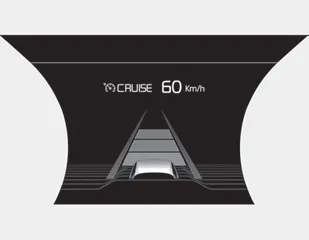
The vehicle speed will maintain the set speed.
When there is a vehicle ahead of you in your lane
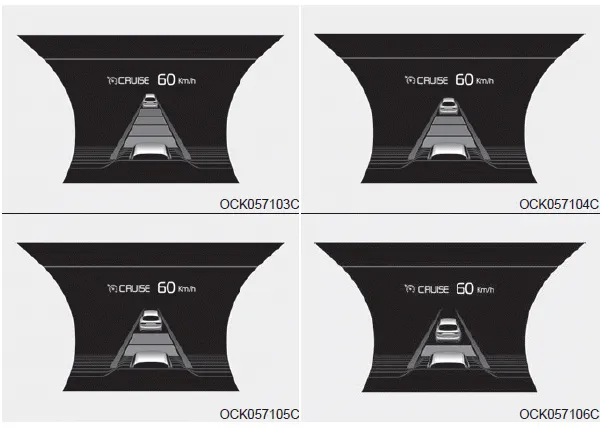
- The vehicle will maintain the set speed, when the lane ahead is clear.
- The vehicle will slow down or speed up within selected speed to maintain the selected distance, when there is a vehicle ahead of you in the lane. (A vehicle will appear in front of your vehicle in the LCD display only when there is an actual vehicle in front of you)
- If the vehicle ahead speeds up, your vehicle will travel at a steady cruising speed after accelerating to the selected speed.
- The warning chime sounds and LCD display blinks if it is hard to maintain the selected distance to the vehicle ahead.
- If the warning chime sounds, actively adjust the vehicle speed by depressing the brake pedal according to the road condition ahead and driving condition.
- Even if the warning chime is not activated, always pay attention to the driving conditions to prevent dangerous situations from occurring.
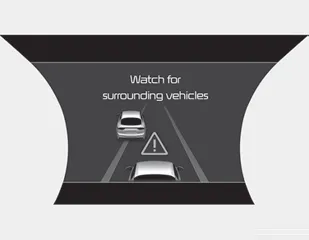
If the vehicle ahead (vehicle speed: less than 30 km/h (20 mph)) moves to the next lane, the warning chime will sound and a message will appear.
Adjust your vehicle speed for vehicles or objects that can suddenly appear in front of you by depressing the brake pedal according to the road and driving conditions ahead.
In heavy traffic
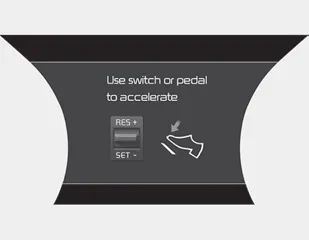
Use switch or pedal to accelerate
- In traffic, your vehicle will stop if the vehicle ahead of you stops. Also, if the vehicle ahead of you starts moving, your vehicle will start as well. However, if the vehicle stops for more than 3 seconds, you must depress the accelerator pedal or push up the toggle switch (RES+) to start driving.
- If you push the smart cruise control toggle switch (RES+ or SET-) while Auto Hold and smart cruise control is operating the Auto Hold will be released regardless of accelerator pedal operation and the vehicle will start to move. The AUTO HOLD indicator changes from green to white. (if equipped with EPB (Electronic Parking Brake))
Radar to detect distance to the vehicle ahead
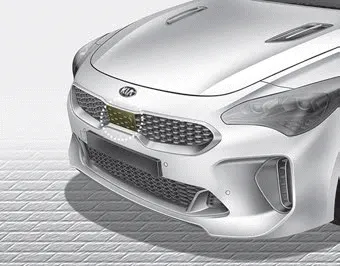
The sensor detects distance to the vehicle ahead.
If the sensor is covered with dirt or other foreign matter, the vehicle to vehicle distance control may not operate correctly.
Always keep the sensor clean.
Radar check message
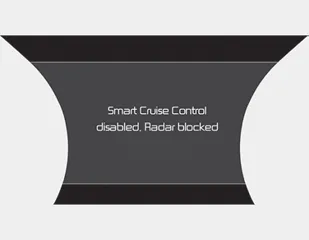
When the sensor lens cover is blocked with dirt, snow, or debris, the Smart Cruise Control System operation may stop temporarily. If this occurs, a warning message will appear on the LCD display. Remove any dirt, snow, or debris and clean the radar sensor lens cover before operating the Smart Cruise Control System. The Smart Cruise Control system may not properly activate, if the radar is totally contaminated, or if any substance is not detected after turning ON the engine (e.g. in an open terrain).
Smart cruise control system malfunction message
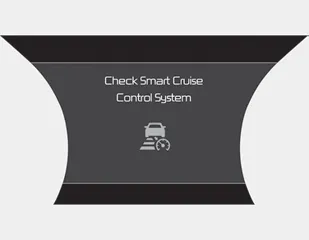
The message will appear when the vehicle to vehicle distance control system is not functioning normally.
Take your vehicle to an authorized Kia dealer and have the system checked.
- Always keep the sensor and bumper clean.
- Use only a genuine Kia sensor cover for your vehicle.
- Do not install accessories around the sensor and do not replace the bumper by yourself. It may interfere with the sensor performance.
- Impact damage to the sensor or sensor area may cause the sensor to move slightly off position and result in the smart cruise control system not operating correctly without any warning or indicator from the cluster. If this occurs, have your vehicle checked by an authorized Kia dealer as soon as possible.
- Use only a genuine Kia sensor cover for your vehicle. Do not paint anything on the sensor cover.
- If the front bumper becomes damaged in the area around the radar sensor, the Smart Cruise Control System may not operate properly.
CAUTION - Sensor Damage
To prevent sensor cover damage from occurring, wash the car with a soft cloth.
Other information:
Kia Stinger (CK) 2018-2023 Owner's Manual: Auto up/down window (Driver`s and Front Passenger’s side)
Pressing or pulling up the power window switch momentarily to the second detent position (6) completely lowers or raises the window even when the switch is released. To stop the window at the desired position while the window is in operation, pull up or press down and release the switch. If the power window does not operate normally, the automatic power window system must be reset as follows: 1.Components and components location Components 1. Steering wheel body 2. Remote control switch 3. Paddle shift 4. Lower cover 5. Wiring 6. Damper 7. Upper cover 8. Upper cover Repair procedures Removal 1. Disconnect the battery negative cable from the battery and then wait for at least 30 seconds.Categories
- Manuals Home
- Kia Stinger Owners Manual
- Kia Stinger Service Manual
- In heavy traffic
- Radar to detect distance to the vehicle ahead
- Radar check message
- Smart cruise control system malfunction message
- New on site
- Most important about car


